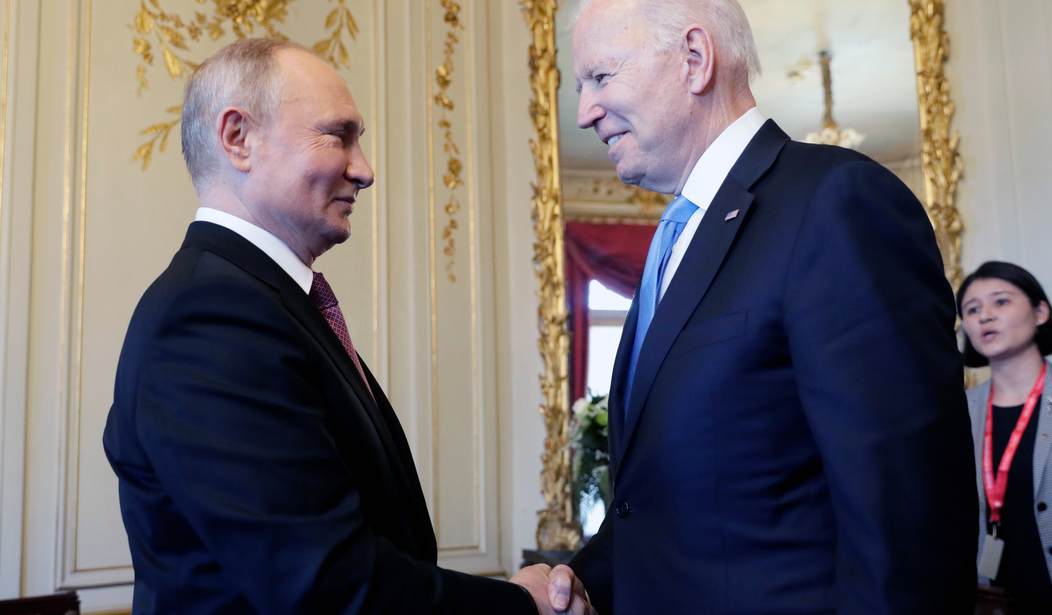Now that the introductory phone calls between Joe Biden and Vladimir Putin are over, the real work being handled by diplomats from both sides will begin this week in Geneva, Brussels, and Vienna. The problem is that most foreign policy analysts don’t see much to be optimistic about in terms of progress. The two phone calls between Putin and Biden produced a few photo ops and some conciliatory words urging calm and a hope to avoid military engagements, but neither side has moved appreciably toward the middle on the major sticking points. There’s a lot at stake here, so this isn’t just a matter of photo ops and talking points. If Russia invades Ukraine (or any other neighbors), the potential exists for the conflict to quickly envelop other countries. And if Biden responds with the full measure of sanctions and other economic and trade measures under discussion, the repercussions for the global supply chain could be very significant and damaging. (Associated Press)
With the fate of Ukraine and potentially broader post-Cold War European stability at stake, the United States and Russia are holding critical strategic talks that could shape the future of not only their relationship but the relationship between the U.S. and its NATO allies. Prospects are bleak.
Though the immediacy of the threat of a Russian invasion of Ukraine will top the agenda in a series of high-level meetings that get underway on Monday, there is a litany of festering but largely unrelated disputes, ranging from arms control to cybercrime and diplomatic issues, for Washington and Moscow to overcome if tensions are to ease. And the recent deployment of Russian troops to Kazakhstan may cast a shadow over the entire exercise.
With much at risk and both warning of dire consequences of failure, the two sides have been positioning themselves for what will be a nearly unprecedented flurry of activity in Europe this week. Yet the wide divergence in their opening positions bodes ill for any type of speedy resolution, and levels of distrust appear higher than at any point since the collapse of the Soviet Union.
Joe Biden’s opening offer to Putin seemed overly generous, if not completely conciliatory. A “mutual troop drawdown” would weaken our position in the region and leave our NATO allies questioning our commitment to the alliance. But Russia is still going to pass on it, asking for far more than either the United States or NATO wants to put on the table. Meanwhile, even as he insists that he has no plans to invade anyone, Putin is looking more and more as if he’d like to get the old band back together and start rebuilding the Soviet Union, or at least a trimmed down version of it.
None of this means that Putin won’t be getting an offer. One of our diplomats, speaking on condition of anonymity, said that Biden is prepared to offer Russia the cancelation of possible future deployments of offensive missiles in Ukraine. He’s even talking about placing limits on future joint American and NATO military exercises in amenable eastern European countries. Those ideas also seem to project an air of conciliation to Moscow while leaving some of the former Soviet nations who are now leaning toward the west hanging out in the breeze.
As if there isn’t enough on our plate already, the talks this week will almost certainly have to address the unfolding situation in Kazakhstan. Just this week, Russia deployed a significant number of paratroopers into that nation to help the government put down protests against the current regime, using deadly force if necessary.
Russia’s decision to send paratroopers into Kazakhstan, where a crackdown on violent anti-government protests has left dozens dead, injects additional uncertainty into upcoming talks over a possible Russian invasion of Ukraine.
The question is whether the unrest in Kazakhstan has changed the calculations of Russian President Vladimir Putin as he weighs his options in Ukraine. Some say Putin may not want to engage in two conflicts at the same time, while others say Russia has the military capacity to do both and he will decide separately on whether to attack Ukraine.
The situation in Kazakhstan is different than that of Ukraine because the government there requested Russia’s help, so we’re not technically talking about another “invasion.” While some eastern European countries have been westernizing and cooperating with NATO, Kazakhstan has been ruled by a plutocracy of wealthy autocrats who benefited greatly from the former Soviet Union and maintain close ties to Moscow. But now there are democratic activists stirring up unrest in the country, leading to repressive responses from the government. Putin obviously doesn’t want to see the country that defines a huge portion of Russia’s southern border suddenly turned over to forces friendly to NATO, so he is no doubt seriously considering sending in even larger military forces to shore up the current government and put down any democratic protests. And since the current government in Kazakhstan is recognized as being legitimate by both NATO and the UN, there may not be much anyone can say about the intervention.
This situation could very likely turn out to be the greatest foreign policy and diplomatic challenge of Joe Biden’s presidency. A significantly bad error in either direction could lead to either an expanding war in Europe or the rebirth of something that looks very much like the former Soviet Union, neither of which would bode well for America or our allies. The goal should be a return to stability and the status quo that has maintained peace in eastern Europe for decades. Let’s hope that Biden’s team is up to the task, though his previous foreign policy maneuvers to date don’t inspire much confidence.








Join the conversation as a VIP Member